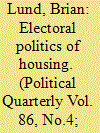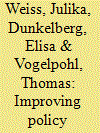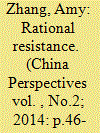| Srl | Item |
| 1 |
ID:
066939


|
|
|
| 2 |
ID:
141757


|
|
|
|
|
| Summary/Abstract |
This article surveys the territorial politics of housing policy with particular reference to the Conservative Party. It examines the how attempts to establish a new planning framework under the previous Coalition government came unstuck and sets out the implications of the planning impasse for home ownership and ‘generation rent’. The territorial and tenure dimensions of the 2015 General Election are considered and possible future Conservative conflicts over land release are explored.
|
|
|
|
|
|
|
|
|
|
|
|
|
|
|
|
| 3 |
ID:
096132


|
|
|
|
|
| Publication |
2010.
|
| Summary/Abstract |
We used the data from a survey conducted in 2008 of 3,000 owners of detached houses to analyse the factors that influence the adoption of investment measures to improve the energy efficiency of their buildings. For the majority of Swedish homeowners, it was important to reduce their household energy use, and most of them undertook no-cost measures as compared to investment measures. Personal attributes such as income, education, age and contextual factors, including age of the house, thermal discomfort, past investment, and perceived energy cost, influence homeowners' preference for a particular type of energy efficiency measure. The implications for promoting the implementation of energy efficiency investment measures are discussed.
|
|
|
|
|
|
|
|
|
|
|
|
|
|
|
|
| 4 |
ID:
112322


|
|
|
|
|
| Publication |
2012.
|
| Summary/Abstract |
Increasing energy efficiency in residential dwellings remains one of the top climate protection priorities in many European countries. In Germany regulatory instruments and subsidy programs, together with communicative instruments, represent the most important measures for motivating homeowners to pursue energy-efficient retrofitting-to date, however, with little success; a tremendous potential for energy savings still exists particularly in the category of single-family houses. The present article primarily addresses the question of how to improve or supplement the political instruments in order to increase refurbishment rates and tap these potential savings; it presents the results of an analysis of existing policy instruments in Germany focussing on the most promising types of building and refurbishment measures that also takes into account the barriers responsible for the discrepancy between potential and actual refurbishment rates. It is shown that consideration of the specific peculiarities and situations homeowners face, coupled with an analysis of the energy saving potentials of their buildings, offers valuable insights and is critical for evaluating policy instruments and finding the mix of instruments that will purposefully encourage the most effective refurbishment measures. Drawing on these results, recommendations for the improvement of current policy instruments and implementation of new instruments are provided.
|
|
|
|
|
|
|
|
|
|
|
|
|
|
|
|
| 5 |
ID:
131818


|
|
|
|
|
| Publication |
2014.
|
| Summary/Abstract |
This article examines the logic and framing of homeowner protests against Waste to Energy (WTE) incineration in Guangzhou. I argue that the concept of "rational resistance" emphasised by homeowner activists represents one way of understanding urban environmental contention in China. Urban homeowners use rational resistance to distinguish themselves from both villagers and the state. Their focus on rationality is a critique of the government's reliance on technology to resolve the social problem of waste management.
|
|
|
|
|
|
|
|
|
|
|
|
|
|
|
|
| 6 |
ID:
160552


|
|
|
|
|
| Summary/Abstract |
How does spatial scale affect support for public policy? Does supporting housing citywide but “Not In My Back Yard” (NIMBY) help explain why housing has become increasingly difficult to build in once-affordable cities? I use two original surveys to measure how support for new housing varies between the city scale and neighborhood scale. Together, an exit poll of 1,660 voters during the 2015 San Francisco election and a national survey of over 3,000 respondents provide the first experimental measurements of NIMBYism. While homeowners are sensitive to housing’s proximity, renters typically do not express NIMBYism. However, in high-rent cities, renters demonstrate NIMBYism on par with homeowners, despite continuing to support large increases in the housing supply citywide. These scale-dependent preferences not only help explain the deepening affordability crisis, but show how institutions can undersupply even widely supported public goods. When preferences are scale dependent, the scale of decision-making matters.
|
|
|
|
|
|
|
|
|
|
|
|
|
|
|
|